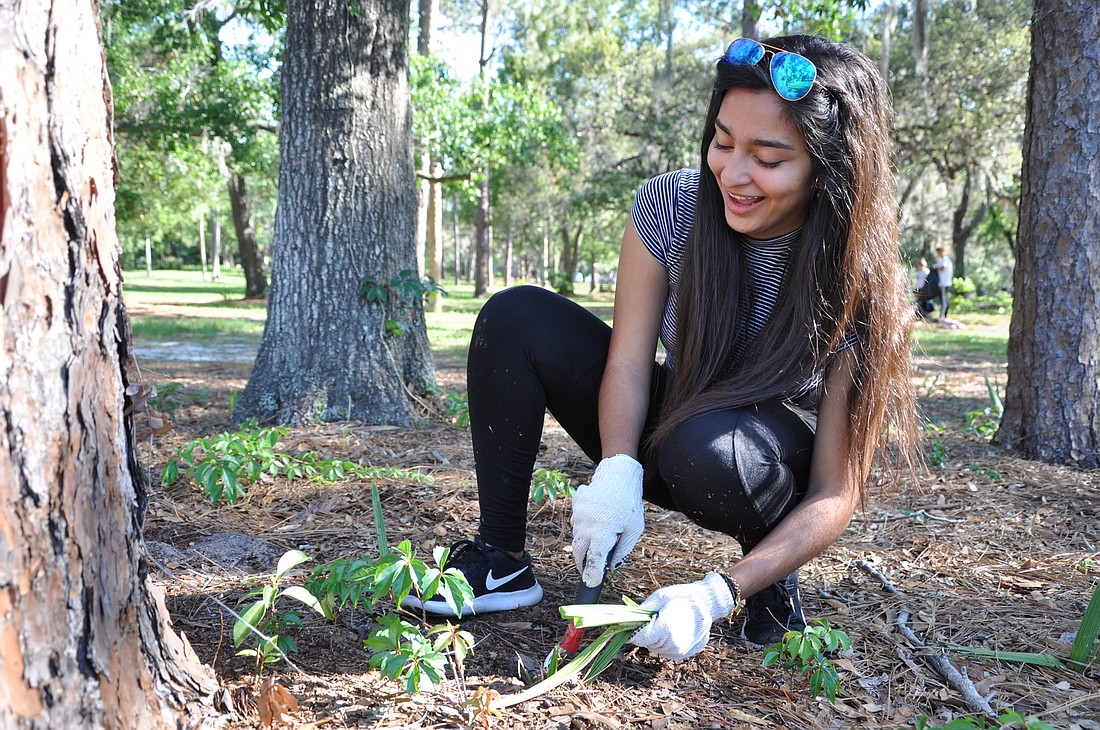- April 19, 2024
-
-
Loading

Loading

Rollins College makes a point of pushing students to become global citizens — and preserving local ecosystems is no exception.
Biology students at Rollins College learned about conservation while lending a helping hand during a workday on Saturday, April 28, at Mead Botanical Garden in Winter Park.
About 75 college students removed invasive species from the garden grounds like skunk vine, camphor tree seedlings and Mexican clover, which compete with the existing live oaks and longleaf pine trees for soil nutrients and sunlight.
“The goal is to help Mead Gardens to restore the native communities of Florida to the garden,” professor of biology Kathryn Sutherland said. “To do that, they need assistance removing the plants that have come in — most of which are invasive, non-native plants.”
This is the second year that Rollins College students have participated in a conservation project at Mead Garden. Last year, students worked in the butterfly garden, removed invasive tree seedlings, planted native plants and built a protective fence around a gopher tortoise burrow.
It’s hands-on learning, and it sure beats just sitting in a classroom, student Claire Lambert said.
“It’s one thing learning about conservation, but actually going out in the field and practicing ecology and helping out the environment is pretty important,” Lambert said.
Sutherland said that is the idea behind the outdoor labs like the one last Saturday. If the students make memories in the environment, the lessons are far more likely to stick with them, she said.
“They remember being out early on a Saturday morning working outside,” Sutherland said. “If they have a wildlife sighting, they’re going to remember that. It sticks with them. I hope they walk away knowing that one person can make a difference — that just a couple of hours on a Saturday morning with a big team of people you can have a huge impact on your local community and on the local ecosystem.”
It’s important to control the species in an ecosystem, otherwise unwanted plants will take over.Wildlife could be impacted if the native plants die off, Sutherland said.
“(The invasive species) dominate the community, and they out-compete the native species, and you get a change in the natural community that should be here,” she said. “In this area, they’re trying to restore the native sandhill crane community. … (Invasive species) can change the plant community, which will then have an immediate impact on the animal community as well that rely on particular plant landscapes.”
Student Taylor Toatley said making a difference in a local ecosystem makes her want to spend more time protecting and preserving outdoor areas.
She and students Eric Grimm, Alexandra Lichtner and Hannah Lesko used shovels and other tools to pull large skyrocket roots from the ground near a small pond. The group took a brief moment of rest before spotting an egret wading through the water looking for food. In that moment, the work seemed all the more important.
“It makes me feel like I’m doing something,” Toatley said. “Instead of sitting in class saying, ‘Man, I wish I could do that,’ or, ‘I would do that,’ I’m actually doing it. I feel like I’m contributing so it’s really cool. There’s more work to do.”